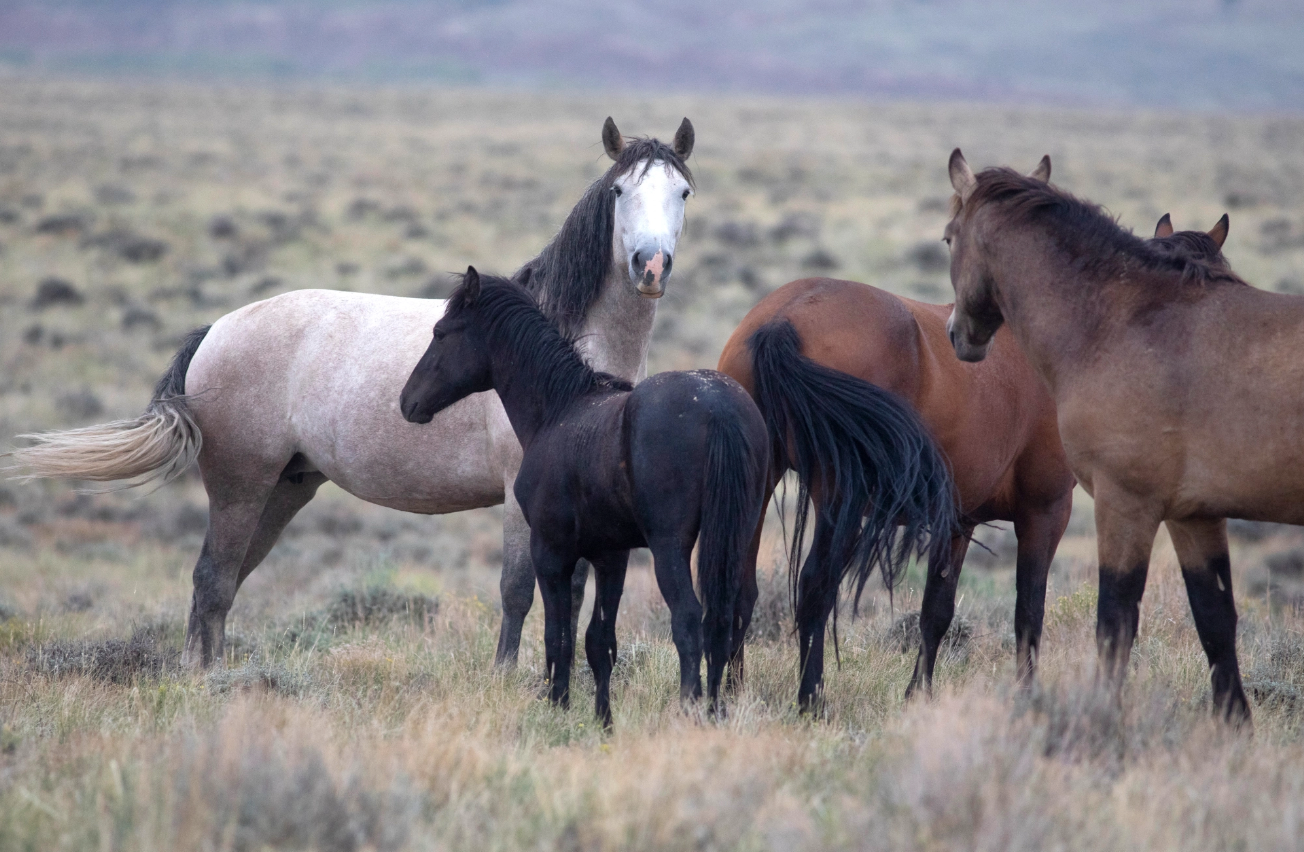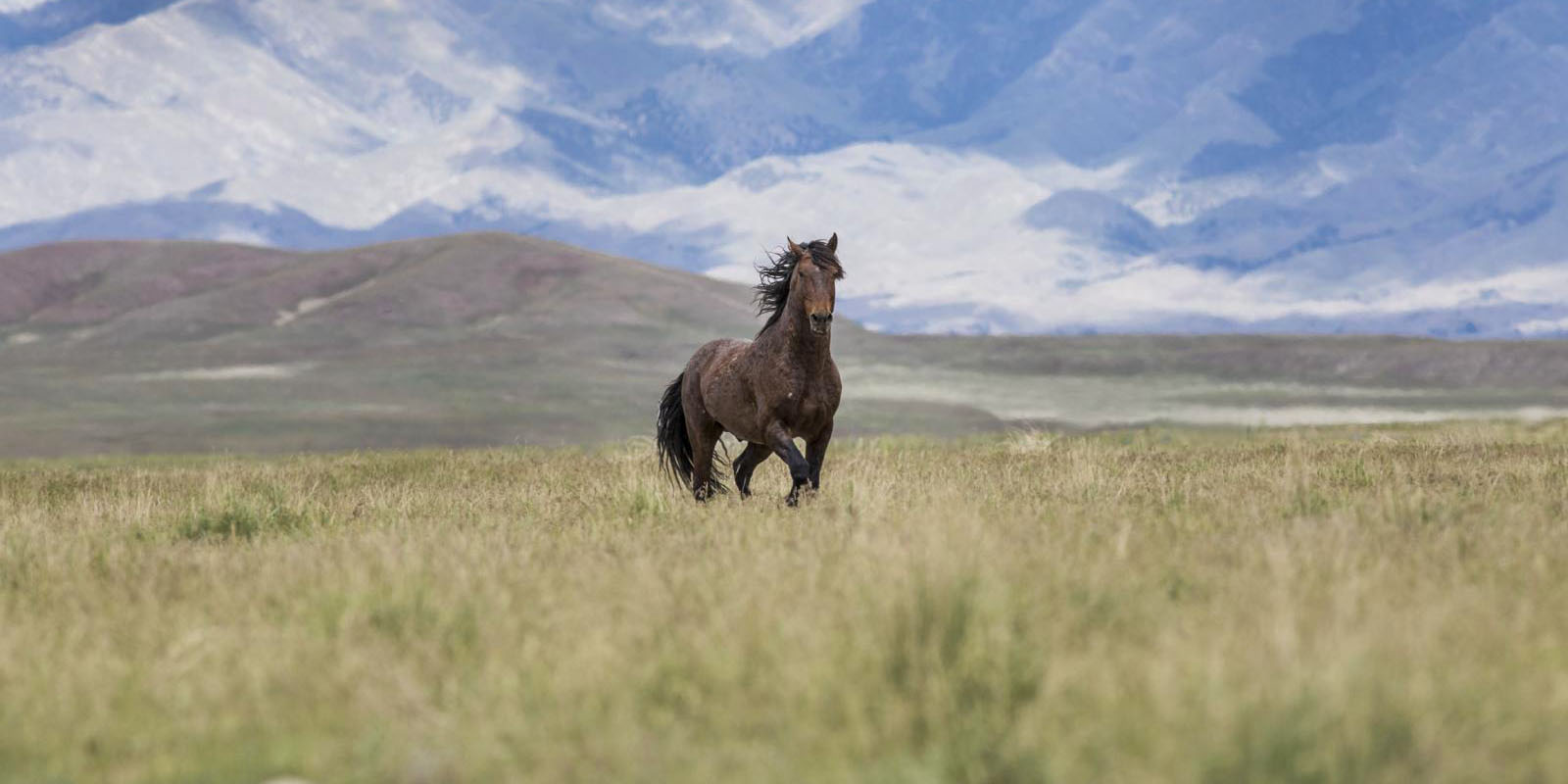By Jennifer Brown, Colorado Sun
(June 15, 2022) Federal officials will begin capturing hundreds of mustangs roaming in far northwestern Colorado this week, dismissing a request from Gov. Jared Polis to halt roundups while the state and U.S. Bureau of Land Management find a “more humane” option for managing wild horses.
The federal agency’s announcement of its next roundup — in the Piceance-East Douglas rangeland outside Meeker — comes after 145 wild horses died in an equine flu outbreak at a Cañon City holding facility.
The public land where the East Douglas herd lives is suited for no more than 235 horses, according to the BLM, yet there are 1,385 mustangs on the range. The roundup is scheduled to begin Thursday with a bait-and-trap operation, in which horses are lured into a corral with fresh water and food. Federal officials plan to bring in a helicopter and horseback riders in mid-July to round up more mustangs.
The roundup was originally scheduled for September, but the BLM moved it to this week because the horses are so malnourished coming out of winter, officials said.
“We saw some horses really suffering in March and April,” Elijah Waters, the BLM’s northwest district manager, said in an email. “We were getting quite a bit of feedback from the public to do something, and we felt like the best option was to gather as soon as we could for the horses in poor condition and for the horses that will remain and need forage before going into next winter.”

The animals will go to a holding facility in Utah — not the pens on state prison grounds in Cañon City that were the site of the deadliest mustang flu outbreak on record.
The horse deaths, which began April 23 and stopped May 26, incited outcry from mustang advocates around the country and Colorado’s governor and first gentleman, Marlon Reis, an animal rights advocate. Polis already had urged federal officials last summer to pause wild horse roundups and work with Colorado on a gentler solution to the abundance of horses on public lands. That plea came ahead of a helicopter roundup last summer of 684 horses in the Sand Wash Basin in northern Colorado along the Wyoming border.
After the Cañon City outbreak, Polis again wrote to the BLM asking them to call off scheduled roundups.
The federal agency’s Stephanie Connolly, acting state director for the BLM, rebuffed the governor’s request in a June 2 letter, which was released to The Sun on Tuesday. She said that while the BLM appreciates the governor’s “engagement in managing wild horses,” the East Douglas herd is more than six times the size that the land can support. A few hundred of the horses have left the public rangeland, Connolly said, “in search of food and water on nearby private property.”
The herd has grown by about 20% each year, she said. And BLM research found that 80% of the shrubs and grasses consumed on the rangeland last year were eaten by wild horses, which is out of balance for other animals that use the land, she said. Public land managed by the federal agency is leased to cattle and sheep ranchers, as well as used by elk, deer and other wildlife.
“The situation will only grow more dire for these horses, wildlife and the environment,” Connolly wrote.

The governor’s office told The Sun this week that it was disappointed by the BLM’s decision to move ahead with a “costly and wasteful roundup of our wild horses.” The governor offered “numerous cost-effective and humane alternative methods of management,” including birth control, but those were ignored.
“It is apparent not only that they will not seriously consider better alternatives, allowing only a few weeks for bait-and-trap methods, but that the agency truly doesn’t care to first listen to stakeholders before moving forward,” Polis’ spokesman Conor Cahill said. The governor was particularly disappointed that the BLM announced its plans for the roundup at the same time it announced a listening session to gather public input.
Polis urged Coloradans to contact the BLM, which is holding its listening session Wednesday night.
The governor did get one of his wishes granted by federal officials: no additional horses are headed to the holding pens in Cañon City.
All of the horses that died in this spring’s outbreak were from the West Douglas rangeland, along the Colorado-Utah border. The craggy, mostly inaccessible land was deemed “unsuitable” for wild horses by the BLM, and last summer, the agency announced an emergency roundup of horses and burros.
The outbreak was caused by a fairly common equine flu virus and was further complicated by a streptococcus bacteria. Most of the horses had not received a flu vaccine despite being hauled to the holding facility seven months earlier, and the BLM has said it is investigating the reasons for the delay and will release details later.
The American Wild Horse Campaign said it was alarmed by the federal plan to accelerate the roundup, calling it inhumane to send more mustangs into holding facilities that have been plagued with disease. Holding pens across the country are already crowded, said the campaign’s executive director Suzanne Roy.
“The BLM already has a capacity crisis on its hands,” she said in an email. “The agency must not use a limited emergency as an excuse to accelerate a wholesale helicopter roundup of hundreds of wild horses and send them to a broken holding system where they are at a heightened risk of disease and death."
Nationwide, the bureau has more than 56,000 wild horses and burros in holding pens or pastures, some awaiting adoption. That includes more than 2,000 horses in Cañon City, where prison inmates care for the animals.
The agency estimates there are about 82,000 wild horses and burros roaming rangeland in 10 Western states, but says the land is appropriate for only about 26,000 of them. In Colorado, about 1,800 mustangs remain on range, but the federal goal is 827.


